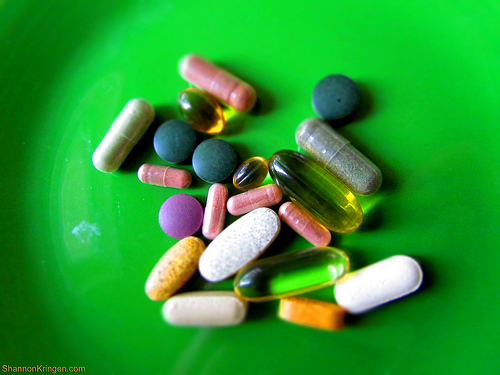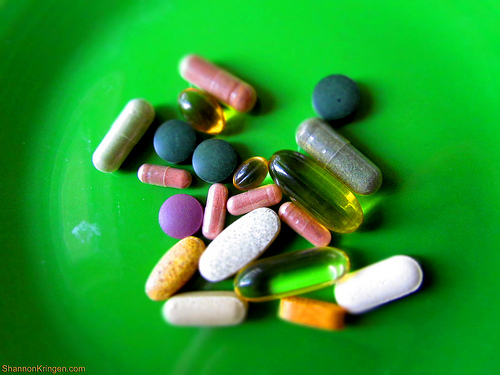Send your question to Umbra!
Q. Dear Umbra,
Hi. I am an ovo-lacto vegetarian. I am worried that due to my diet I may be lacking in omega 3 fatty acids. I was wondering if you could recommend a vegetarian-friendly omega-3 vitamin and also a daily multivitamin. I also wanted to make sure that vitamins aren’t bad for the environment before I start buying them. Any help or guidance you could give would be greatly appreciated.
Thanks,
nellatterb
New York, NY
 Look before you swallow.Photo: Shannon KringenA. Dearest nellatterb,
Look before you swallow.Photo: Shannon KringenA. Dearest nellatterb,
I am flattered that you’ve come to me for guidance. However, Grist’s highly trained legal department (which really only consists of this yellow legal pad I just found) would like me to remind you that your friendly neighborhood Umbra is neither a doctor nor a nutritionist, and to consult the proper degree-wielding personnel (look for the ones deep in debt with beaming extended family members).
Now that‘s out of the way! So you’re trying to eat a well-rounded, meatless-but-egg-and-dairy-inclusive diet. I’ve heard lovely things about cod liver oil as a source of vitamin D and those elusive omega-3s, but as it involves, you know, a fishy’s liver, it’s out. Fortunately, certain plant and nut oils also contain this nutritional gem. To wit, it reportedly “lowers triglycerides, reduces the risk of death, heart attack, dangerous abnormal heart rhythms, and strokes in people with known cardiovascular disease, slows the buildup of atherosclerotic plaques (‘hardening of the arteries’), and lowers blood pressure slightly.” So sayeth the Mayo Clinic.
By skipping fish sources for omega-3s, you won’t have to worry about related mercury concerns. Ye olde Mayo instead recommends English walnuts and vegetable oils like canola, soybean, flaxseed/linseed, or olive oil as non-vitamin sources. Another doctor recommends leafy greens like kale, spinach, and Brussels sprouts. When looking at vitamins, you’re going to want to steer clear of gelatin, which is in those clear gummy capsules (and is made from animal bones and skin). The ever-provocative PETA has the handy mnemonic “gelatin rhymes with skeleton.” Shudder.
Vegetarian and vegan vitamins — how’s that for alliteration? — are sometimes made with the sensual-sounding V-Gel, an animal-free gelatin substitute made from seaweed. I’m loath to recommend specific brands and products, but here is one multivitamin especially for vegetarians, and here are a vegan omega-3 softgels. Rather pricey, but there it is. Keep in mind that some question the effectiveness of vitamins at all.
The problem with vitamins comes when we see them as a license not to eat fresh vegetables, legumes, and other things in season. Doctors say vitamins in food affect the body differently than vitamins in pill form do. As dietician Sarah Schenker says, “[T]hese foods [fruit and vegetables] contain far more than the classic vitamins and minerals we all know about. They contain many other plant substances, known as phytochemicals, which can’t be put in a bottle or made into a pill.” You heard it here first. There’s no pill that can encapsulate the magic of the tasty kale chip.
Nutritionally,
Umbra



